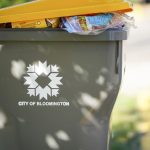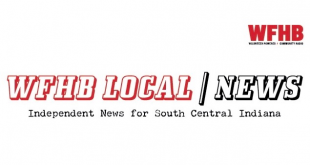Podcast: Play in new window | Download (Duration: 6:32 — 6.8MB)
Recycling has been growing exponentially for years, but it wasn’t until recently that cities have found issues with the abundance of recycling and contamination issues from it. Junior Correspondent Katrine Bruner reports on the impact that contaminated recycling has on the City of Bloomington and Monroe County.
It’s the crack of dawn and as many citizens of Bloomington are asleep in their homes, recycling trucks are going door to door to collect household recycling throughout the whole city. The amount of recycling in Bloomington has increased exponentially as the college town grows more each year. The City of Bloomington Sanitation Department began providing one recycling cart per household free of charge in the year 2018.
Since before, citizens had to pay for a sticker in order to get their recycling collected, the carts gave much more incentive for people to recycle. However, national changes to recycling management were made in recent years that have negatively altered the recycling systems in the U.S. In 2017, China made the giant step in changing their management limits on recyclables. The worldwide importer for U.S. recycling used to accept 60 pounds of non-recyclables per ton of their collection. Now they are only accepting 10 pounds per ton, or .5%.
This is a huge change that has altered the work of companies, districts, and even citizens.
***
So what does this mean for the state of Indiana specifically? I spoke with Executive Producer of Monroe County Solid Waste Management District, Tom McGlasson who has been working with the organization since October of 2003. He explained to me the toll that this management change takes on the people processing recycling, such as an overabundance of waste and recycling that the U.S. has no space for.
McGlasson went on to say that there are even more issues with this change such as how it affects business in the recycling management industry.
The Solid Waste Management District was formed in the late ‘90s as a way to collect solid waste in Indiana apart from the city. This way, citizens who cannot receive direct city services are given another option to get rid of their recycling and waste safely.
One of the major differences between the city and district services is the issue of contamination. McGlasson explained how many cities are experiencing this as a direct result of China’s changes because of the extra time and money needed to filter out non-recyclables from the collection. The Management District differs from that because of their systems for processing.
As a vital component of this process, McGlasson can relate to how this issue puts a dent into organizations like the Management District. He briefly stated his hope for companies like theirs to be able to get more capacity for recyclables in order to avoid more trouble down the line.
McGlasson assured the public that there is hope for the recycling management in Indiana as well as the U.S., urging citizens and communities to help improve systems by recognizing the changes happening.
As such a worldwide issue this has become, it can easily be condensed into communities and then brought back out as a nationwide issue for the U.S. That is to say if communities such as Bloomington show awareness, change is just around the corner.
One simple step to achieving this goal is for households to recognize what can and can not be recycled in their areas. The Bloomington Sanitation Department lists on the City webpage many items to help citizens know the difference.
Some examples of recyclables are dry paper products, aluminum cans, foil, and newspaper sleeves. Examples of non-recyclables for the city include food-grade cardboard such as pizza boxes, all forms of styrofoam, and packing peanuts.
As McGlasson stated, there are many options for recycling in Indiana. The City of Bloomington Sanitation Department is just one, so just because something can’t be recycled in one place, doesn’t mean it should go directly in the trash.
 WFHB Bloomington Community Radio
WFHB Bloomington Community Radio





